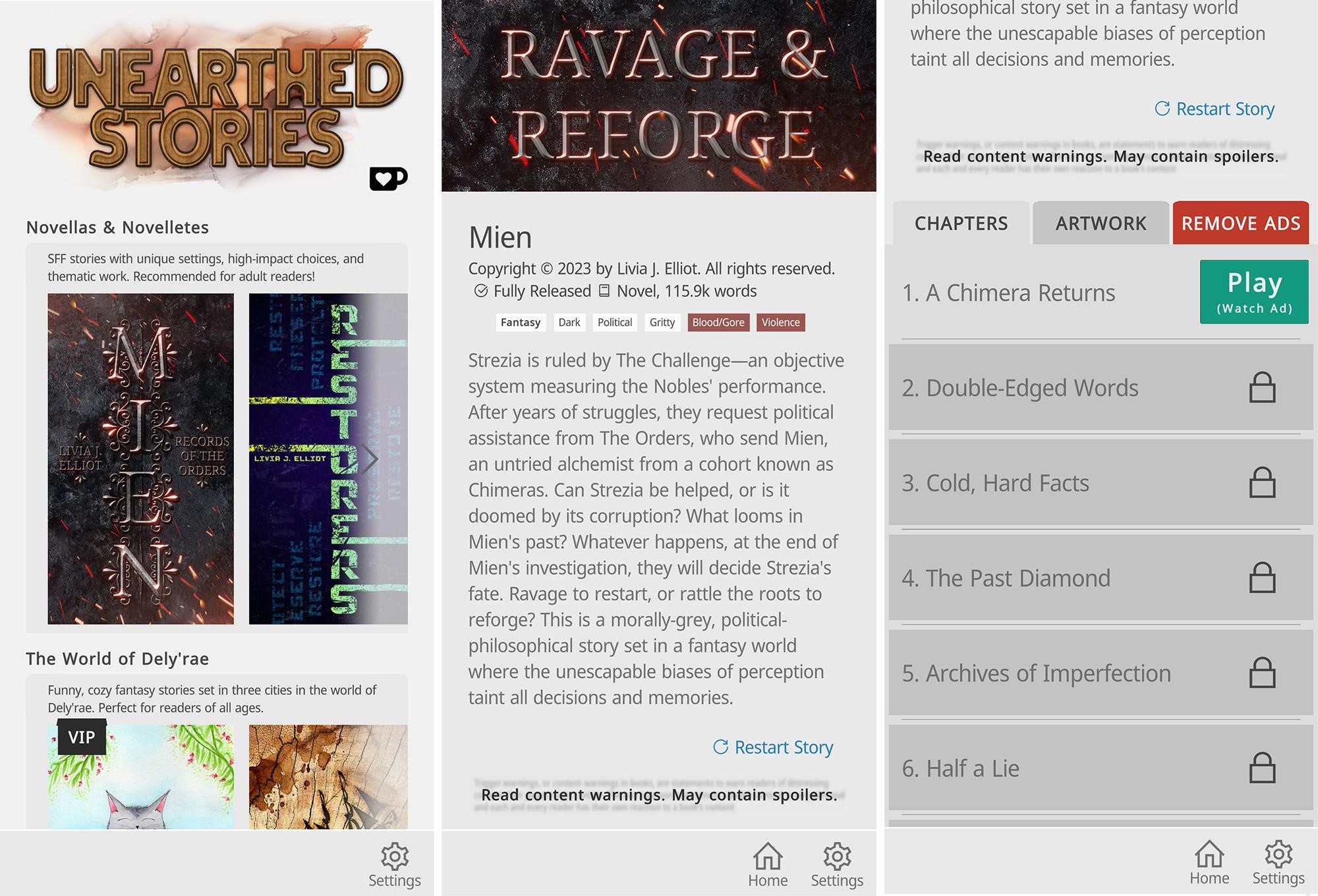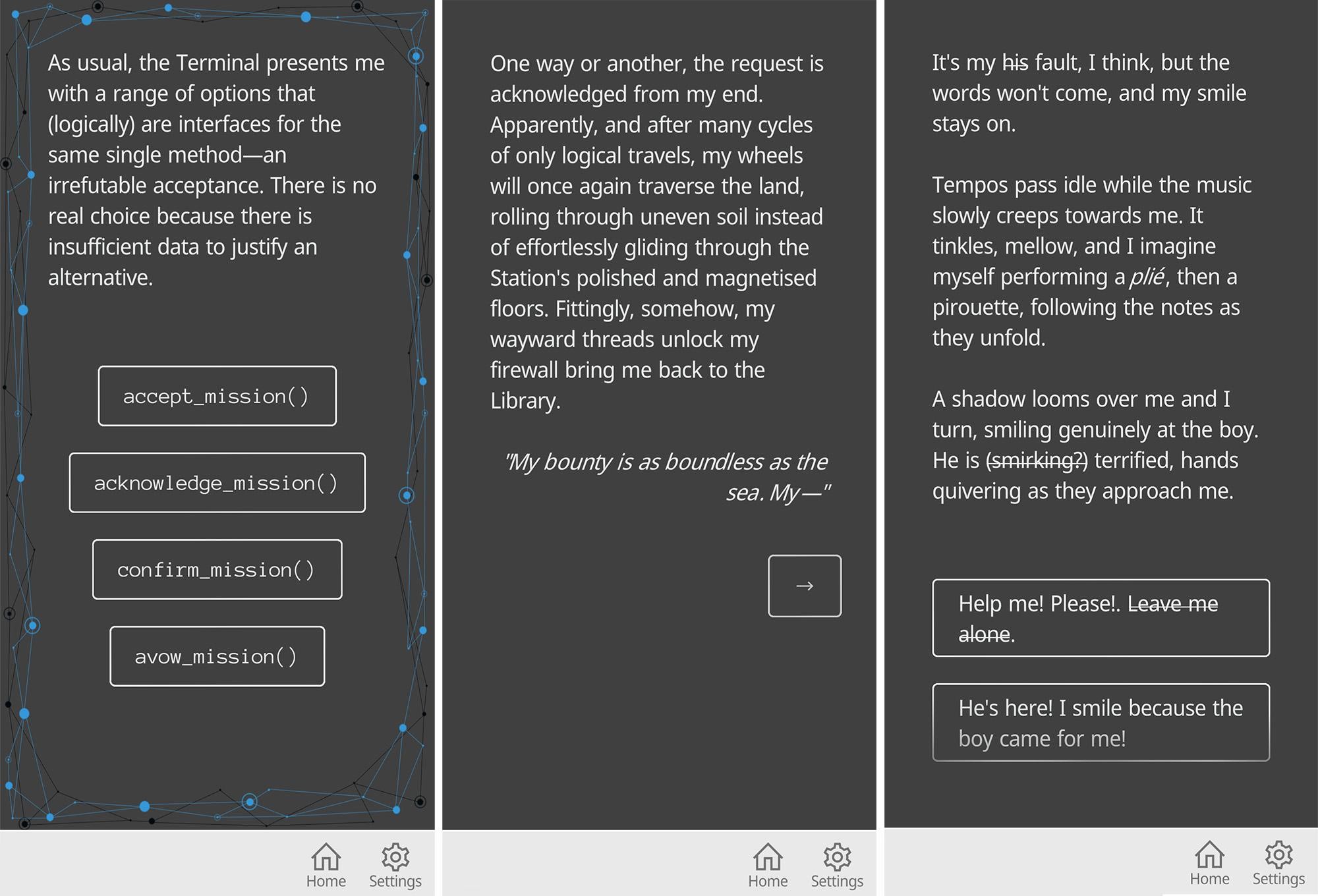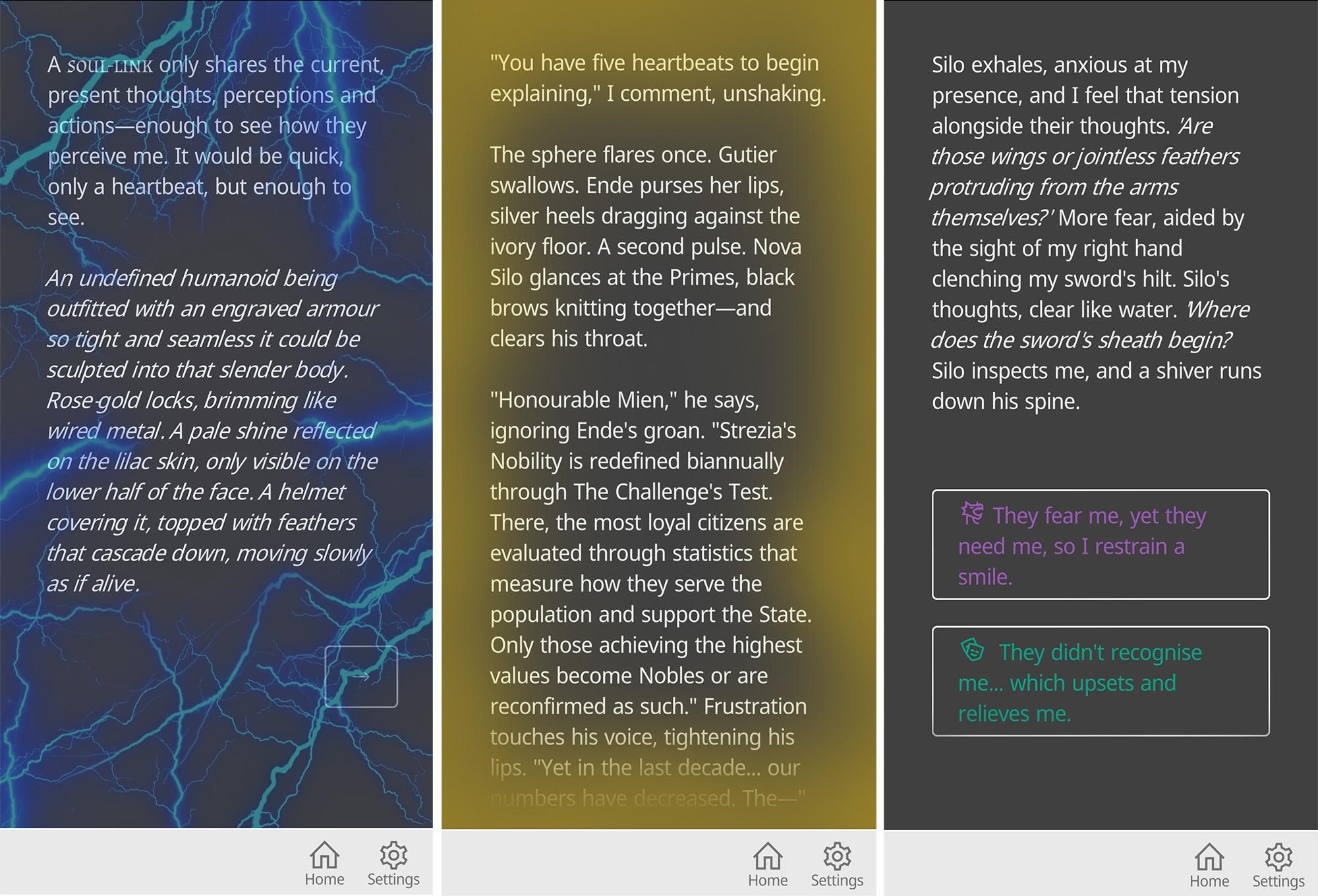Unearthed Stories, interactive fiction and a different way to express - Livia J. Elliott
12 Feb 2024"When a door closes, another opens, the saying goes. But sometimes, it felt as if all doors were closed, and I was scrambling for the key others withheld." I hastily scribbled those lines after life had been unkind for years. At that moment, I was decided to quit writing, even as a hobby. Yet those lines later became the opening of Mien.
- - -
I've been writing my whole life. I was taught to read very early, began to read fluently at an early age, and by my 10th birthday I was already reading anything just to escape to other worlds because life forced me to grow up very quickly. Soon into my teens, I began worldbuilding for the same reason, writing (with age-appropriate quality!) to process what life threw at me. It was always fantasy or sci-fi, because the farthest away from this world, the better.
Because of that, to me, writing is always about the themes, and putting into words the topics that need to be unloaded off my chest. I write with plenty of allegories, because such indirect approaches give nuance to the text and let us find even more of what we originally wrote. But more importantly, allegories let me explore topics in a way that's healing yet implicit.
So, I wrote, published web-novels in my native language (Spanish), and kept a self-hosted blog for years. But life tends to just happen, and for almost a decade, the stories lived only in my mind as I drifted away from the keyboard.
By 2020 I was not in a good spot, so when I told my partner, "I want to write again," he nodded and offered to help. I chose to start with a story dear to me, then a shorter one that was quite personal, and short-stories with heavy thematic work. But querying agents did not end well. Many told me that my writing wasn’t sellable or marketable, or that I wasn’t marketable… and it broke my heart.
During July 2022, I had stopped writing at all, and more than once was thought of deleting all my drafts. I really felt there were no doors open to me–but I was, happily, wrong.
My partner, who is an indie game developer, came with sparks in his eyes and a mischievous smile, and told me, "Let's make a game together; a bookshelf of interactive stories. You can write whatever you want."
For years I've been thinking that there were no doors open to me (exactly as I wrote on Mien's opening lines), and my partner just came in and opened one for me. I agreed immediately, one because he was being adorkable, but second because his dream was also to have a successful game out there… and we could help each other.
That is how Unearthed Stories came to life. The acronym, US, says it all—it's our project.
We started working, and as usual every story had a piece of me. I wrote Dance With Me after feeling cracked but forced to keep going, Mien to complain about my previous career path (the author's notes explain it), Restorers because everything I've learned in life has helped me make more informed decisions. Another one (landing in April) because I needed to discuss emotional language.

Leftmost is the bookshelf view. Centremost is a book’s description and tags. Rightmost is a book’s chapter index.
I won't lie, moving from writing regular books to books-with-choices (or interactive fiction) was not easy, and I rewrote some of my stories (cough, Restorers) so many times because it didn't feel right.
At first, I picked Restorers because it was a short-story and I naively thought that adapting the text would be straightforward—and I couldn't have been more mistaken. Yes, books-with-choices are mainly text, no visuals and no sound... but ultimately, they are a different medium, and beyond planning the plot (I'm an extreme plotter) I had to plan the mechanics, then test the mechanics (like you’d do with a game prototype), and sometimes find out that the plot was working just fine, but the mechanics were not.
Let me elaborate on that.
In games, mechanics are "the rules or ludemes that govern and guide the player's actions," namely, what the player does to actually play. For example, you can open portals (Portal 2), you can fire weapons and reload (a shooter), you may need to defend a tower for a period of time... Mechanics indicate how a player interacts with the game's world—and thus, they may work wonderfully on paper, and then be a complete bore when coded; they may get repetitive, grilling, or not convey what the plot requires. That's why, in game development, we do ugly prototypes just to test the mechanics before actually developing the real deal.
In books, there is a single mechanic—read (or listen). A reader’s engagement is always done in the same way, and thus you rely single-handedly on the writer's skill to absorb the reader's attention and immerse them.
In books-with-choices you can do more and, most likely, the reader knows you can do more and (perchance!) expect it to be similar-but-not-quite a book. Interactive fiction is a different medium.
Here, choices are narrative elements, and I use them as such to "show not tell" (in a completely different way), enhance the experience, or even bias the reader to feel an emotion. Let me give you to examples:
● In Dance with Me, the protagonist (Lyra) is a survivor, and many times she'll offer a choice (often the most sensible for a non-depressed, non-traumatised person) and as soon as the reader picks it, Lyra scratches the text and does something else. I did that entirely on purpose. It's frustrating, awfully so, just like it is frustrating to survive emotional abuse and cope with the automatic reactions ingrained because of it.
● In Restorers, the robot protagonist, XB-12, is bound by a Code and so, some decisions are aliases (in the programming sense) of the same single option. XB-12 complains loudly, and depending how much new information the reader decides to get (by obeying or disobeying orders), you may end up with more or even fewer options.
Writing Dance with Me in that way wasn't easy—I had to frustrate the reader just so, to make it engaging but never obnoxious. We tried multiple attempts, my partner tested, and it went on for weeks.
My partner is the developmental editor but also the game tester—meaning that he assesses the soundness of the plot and events, but also if the mechanics are actually working. We have had cases of elements working plot-wise but being awful mechanic-wise… and that led to multiple deletions and rewrites of the same scene, with the same plot beats, but played through in a different way by having new mechanics.

A key element of the choices is their consequentiality, perceived or real. You
need to understand that not every choice diverges the plot and that,
ultimately, you can't have infinite variations (which you may have in a
procedurally-generated world, like Diablo’s). Therefore, one character choosing
to think while pacing or while standing has an immediate effect on the body
beats, but not in the plot. Likewise, some choices need to stew in the plot and
then boil several chapters ahead, while others will have an immediately
perceivable effect.
For example, in Mien, many of the choices from chapters 3-8 will explode in chapter 9, and split the story from chapter 10 onwards into two endings with several variants each. Likewise, at the end of chapter 1 you choose who to speak to, and thus chapter 2 has two variants–either you speak to one character, or the other. And that affects the knowledge you have of them and the world.
Something that is extremely different here, is the linearity of the story—which is linked to the consequentiality I mentioned before.
In a book, a writer can assume that a reader will read linearly from prologue (or chapter one), to the ending... unless you are Cortazar writing Hopscotch. Thus, if a reader is in chapter 5, the writer assumes they read all the content that happened before.
In interactive fiction, I can never assume that a reader knows everything that I wrote for the previous chapters, simply because they may have not visited that path due to the consequences of their choices. Truly impactful choices may affect a character's knowledge, and thus, a reader's knowledge... and using "information a character doesn't know" can become a plot hole in a way that doesn't happen in traditional books. This opens up a little Pandora’s box at the moment of editing/testing, because we need to review as many paths as possible.
Therefore, I need to write alternative discussions, decisions, and paths, depending on all the possible combinations of knowledge one character may have. For example,
● In Restorers, the knowledge you gather will enable or disable different choices towards the end, effectively leading to six (6!) different endings.
● In Herald, the protagonist (a cat working as a spy), may be able to do one mischief or another, and then be grounded or not—this is a cozy fantasy, if you're wondering.
● In Mien, a grimdark novel, you can literally choose to kill or spare a relevant character (a few of them, actually), so if the reader chooses to kill... it affects the plot. The other characters behave accordingly, the main character thinks differently because now there is the worry that the corpse could be found. Moreover, if the character is dead… they can’t give you any more information.
Moving forward, the placement of choices is critical, because interactivity is key for engagement. In interactive fiction, engagement is generated as in a book (worldbuilding, plus character work, plus themes, plus others...) but also due to how much can the reader actually influence the story, and how often. Otherwise, the sense of "control" over the narrative is lost.
Although I don't think there is a correct placement (I experiment a lot, I won't lie), there is a limit to a reader's patience. Because of this, while in a book you can spend two pages speeding-up a few years without having the character do anything... here it is not that easy. The reader could grow frustrated at the lack of options and the apparent lack of control.
This type of writing makes the narrator even more narrow than in a regular book. I write the stories in a way that the reader controls not only what the character says (e.g., the dialog bits), but also the narrator bits which, like in any first person book, are the character's thoughts or impressions. Therefore, if the reader chooses never to speak with others or cuts the conversation short, then the reader will find little information about the side-characters. For example,
● In Dance With Me, (chapter 1) you can meet a pair of twin sisters and listen to their story, which then allows Lyra to interpret another character (in chapters 6-7) quite differently based on what she knows or ignores.
● In Restorers, you can choose to follow your robot companion (and thus find out about their mission), or follow orders and stay behind... in which case you find little about the companion, but may uncover other stuff—spoiler alert, there is no good choice here, all have implications.
Going back to the idea of interactive fiction as, perchance, a sibling medium to books, my partner and I decided to use effects. So, if XB-12 receives a warning, the screen flashes red. If Mien (the character) casts a spell, magic or thunder appears on the screen. When Lyra faints, the screen fades to black.

As you can see, it's like a book but it is more. And if you're wondering how does it work, here is a video of me narrating the very beginning of Restorers–I’m not a professional narrator, but I tried my best. (Link here)
After all of this, you may want to try them for yourself. The bookshelf app, Unearthed Stories is actually free and most stories are also free!
● You can read in Android right now: https://bit.ly/unearthedstories You can download and start playing immediately!
●You can preorder for iPhone/iPad: https://apps.apple.com/us/app/unearthed-stories/id6474701738 If you preorder now, it'll install automatically on release date, March 6th. Preorders will really, really help us!
●You can subscribe to my newsletter for exclusive insights (of the app and my podcast), bookish discussions, and perhaps beta test new stories!
This is just the beginning. We have so many plans—so let me say that two new books-with-choices will be released in April:
● A dark coming of age with an added quirkiness—it remembers that you played it. This story is about how lacking emotional language affects the survivors of complex trauma.
● A philosophical time-loop dungeon-crawler in which the order of the rooms changes, you can miss out on rooms, and well... you may need to fight a Dungeon Master of dungeon-twisting wrath.
A secret project is coming in May, and a very, very dear story for me (and quite personal) will be announced in July... but there are also long-term plans as well! We would love to hire other authors, and grow Unearthed Stories into a huge library of theme-centric interactive speculative fiction.
We are nowhere near that, but I hope we'll get there. With your support, we can.
Thank you so much for reading!
~ Livia J. Elliot
About Livia J. Elliot

Australian-based author of psychological, dark fantasy fiction with heavy themework. Host of the podcast Books Undone, specialised in deep-dives into speculative fiction. Writer of Unearthed Stories, books with choices available in Android/iPhone.
